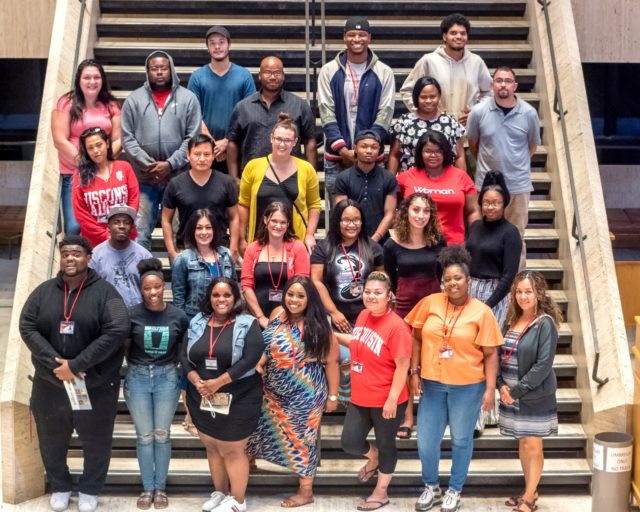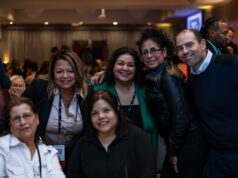For UW-Madison Odyssey Project students and families who were financially struggling already, the COVID-19 pandemic has been especially devastating. Beyong economics, being unable to meet in person has increased social isolation and depression that has been overwhelming on an emotional level.
“This pandemic has really highlighted the discrepancies, especially for students of color who have already been struggling with lower incomes and fewer resources, and now are being hit disproportionately hard by schools closing and jobs laying them off and lack of support systems around them,” UW Odyssey Project Director Emily Auerbach tells Madison365.
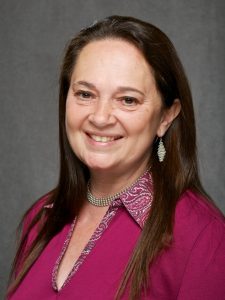
Now in its 17th year, the Odyssey Project offers a free two-semester humanities class for 30 people where they provide textbooks, childcare, and a weekly dinner. According to Odyssey statistics, all Odyssey students live near the poverty line, over 90% are people of color, and over half are single parents. The students earn six credits in English from UW-Madison, and are introduced to great works of literature, philosophy, history, and art and helping them improve skills in writing, reading comprehension, and critical thinking.
“The Odyssey Project depends so much on community. We are working with community meals, with lively discussion face-to-face, with hugs,” Auerbach says. “I had one staff member tell me that he had gotten more hugs in one night of Odyssey class than he had in 7 years in his academic department on the UW campus.
“Trying to continue that warmth and community and engaged discussion has definitely been a challenge since the coronavirus pandemic hit,” she adds.
COVID-19 restrictions have prevented the students from meeting in person for class, where free community meals and take-home food for families are provided along with additional support services, such as empowerment groups, tutoring, and in-person counseling with a social worker, academic advisor, and financial advisor.
“We’re doing meetings online like everybody else, but it’s just not the same,” Auerbach says.

Odyssey’s last class face-to-face was on Wednesday, March 11 in south Madison. “I gave out enough homework for a month thinking we would be back together in April. I had no idea at that point that we wouldn’t be returning to classes or having graduation on May 6,” Auerbach says.
That is one of the major highlights of the year – the May Odyssey graduation ceremony on campus – where families and friends congregate with great food, cake, giant poster boards honoring each student and balloons. “We usually have about 400 people in the audience at this event and each student gets up on the podium and they share something that they’ve written in class,” Auerbach says. “It’s just this wonderful, emotional celebration.”
They obviously won’t be able to do that on May 6.
“What we’re planning to do is a virtual celebration on that date and just hope that when all this lifts and we are able to be together again that this group will be able to get together and have the right kind of celebration with families included,” Auerbach says.
At graduation, each student normally gets a $100 gift from the endowment in Auerbach’s mother’s memory.
“We’ve moved that up to get those checks out to students now because I have students who can’t put food on their table or don’t have gas to go to the food pantry or can’t pick up medication,” Auerbach says. “I know that my mother, who grew up in poverty, would want funds now for real necessities.”
Auerbach says that Odyssey recently did a survey of its near 500 graduates of the program over the years and learned that 87 percent of the Odyssey families are struggling with basic necessities like food, medication, and household supplies.
“Around that same number – 85 percent – have had hours reduced or have been laid off jobs [during the pandemic],” Auerbach says. “So we are talking about a very high percentage of our Odyssey families that are struggling right now.”
Many current and former Odyssey students and families desperately need help with rent, food, household supplies, diapers and formula, and medicine for themselves and their families.
Back in 2009, Auerbach started a separate non-profit called Friends of the UW Odyssey Project to help out the students for exactly this type of situation.
“I learned early on that the UW funds that I had or the gifts that went into the UW Foundation could not be used for basic needs,” Auerbach says. “For example, I had a student in a class who broke his glasses and could not see the homework and the university funds would allow me to buy him 20 more books he couldn’t see, but would not allow me to fix his glasses.”
That’s where the Friends of Odyssey Family Fund comes in to help with, for example, rent, an inhaler, a licensing fee, or glasses. Auerbach hopes the community will help add to the fund now to support the students during the coronavirus pandemic. To directly support Odyssey students and families during the COVID-19 crisis, community members can donate to the “Friends of Odyssey Family Fund.”
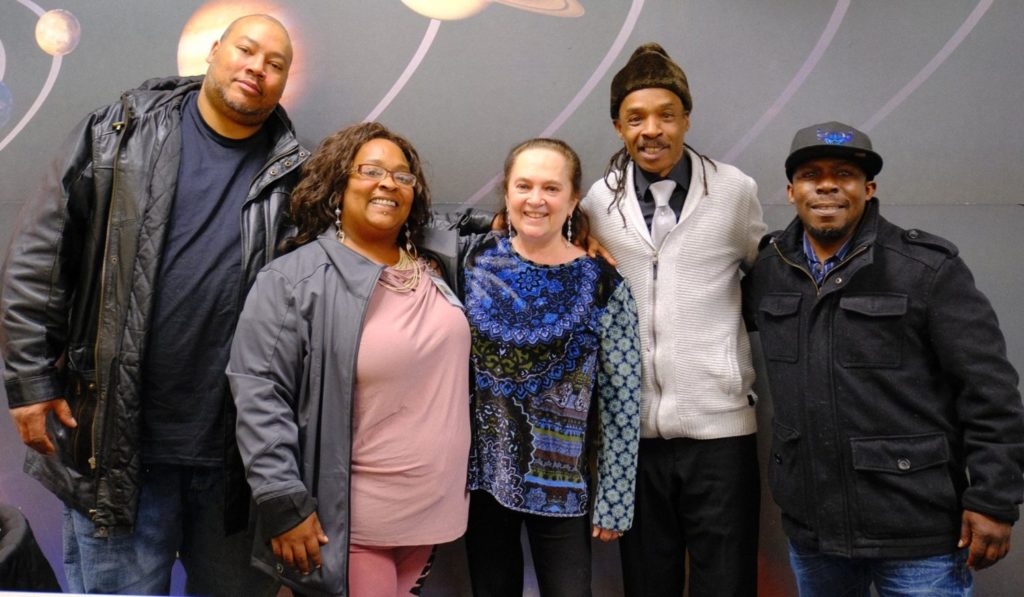
Most Odyssey students struggle with eviction, depression, substance abuse and addiction, domestic violence, incarceration, and other challenges and trauma associated with living in poverty. One in 6 current students are undocumented immigrants.
“Our undocumented students are getting hit especially hard because they are not going to get any government relief and they are often in jobs where they are getting laid off right now,” Auerbach says.
“I am also worried about the mental health of our students. Many of our students are struggling with underlying mental illness and are also in recovery for various addictions and they are already coming from backgrounds of trauma,” she adds. “So this is hitting hard and we are working to link them to resources.”
Odyssey alum Brian Benford, who graduated from Odyssey in 2007 and went on to earn his bachelor’s degree from UW-Madison and is now completing his master’s degree in Social Work from UW this May, has been working with Odyssey as its “success coach” and also as one of our instructors for Odyssey Junior. He’s also been organizing virtual “empowerment group” meetings for Odyssey students and alumni.
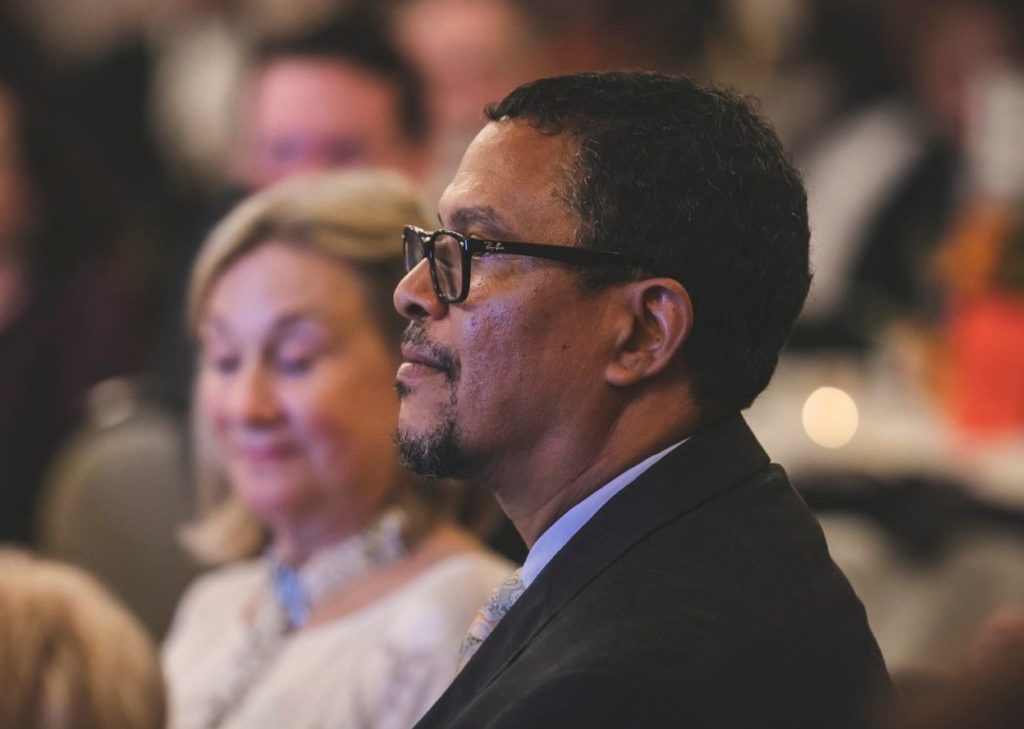
(Photo by Hedi Lamarr Photography)
“He has been helping to link our students to the resources that are out there and to be a listening ear,’ Auerbach says. “He’s quite an inspiration himself. He has such a vast knowledge of neighborhood groups and he’s using it to link people in need to the programs that are out there.”
Benford has been a critically important member of the Odyssey team as they seek to link students to resources and have been providing both a listening ear and practical information to students in crisis. Benford’s selflessness is typical of Odyssey students past and present.
“I’ve been moved by students’ desire to help each other even when they are struggling themselves,” Auerbach says. “For example, one of our students had a relative that died in the car crash that killed four people [in Madison] so one of her classmates asked if he could anonymously donate his $100 [graduation] check to her. That’s even though he was struggling himself. I just see incredible generosity all the time among people who have very little.
“In a time when it seems so many affluent and powerful people lack empathy, here I have students near the poverty level giving everything they’ve got to help each other,” she adds. “With Odyssey, it’s a two-way street. Our students give back more than they receive. They shine as an example of what community should look like.”

























